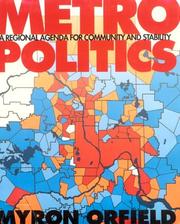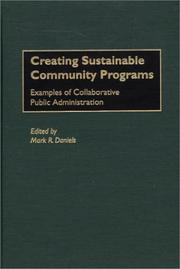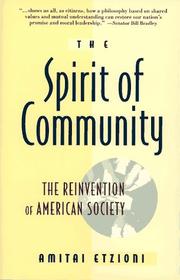| Listing 1 - 10 of 15 | << page >> |
Sort by
|

ISBN: 0815766408 Year: 1997 Publisher: Washington, D. C. Cambridge, Mass. Brookings Institution Press Lincoln Institute of Land Policy
Abstract | Keywords | Export | Availability | Bookmark
 Loading...
Loading...Choose an application
- Reference Manager
- EndNote
- RefWorks (Direct export to RefWorks)
Social geography --- Metropolitan areas --- United States --- Regional planning --- Inner cities --- Urban policy --- Community development --- Community development - United States.
Book
ISBN: 0250400383 9780250400386 Year: 1974 Volume: 1 Publisher: Ann Arbor (Mich.): Ann Arbor science,
Abstract | Keywords | Export | Availability | Bookmark
 Loading...
Loading...Choose an application
- Reference Manager
- EndNote
- RefWorks (Direct export to RefWorks)
Book
ISBN: 9780691147093 0691147094 9780691162072 0691162077 1283009153 1400838827 9786613009159 Year: 2011 Publisher: Princeton (N.J.): Princeton university press,
Abstract | Keywords | Export | Availability | Bookmark
 Loading...
Loading...Choose an application
- Reference Manager
- EndNote
- RefWorks (Direct export to RefWorks)
Volunteering improves inner character, builds community, cures poverty, and prevents crime. We've all heard this kind of empowerment talk from nonprofit and government-sponsored civic programs. But what do these programs really accomplish? In Making Volunteers, Nina Eliasoph offers an in-depth, humorous, wrenching, and at times uplifting look inside youth and adult civic programs. She reveals an urgent need for policy reforms in order to improve these organizations and shows that while volunteers learn important lessons, they are not always the lessons that empowerment programs aim to teach. With short-term funding and a dizzy mix of mandates from multiple sponsors, community programs develop a complex web of intimacy, governance, and civic life. Eliasoph describes the at-risk youth served by such programs, the college-bound volunteers who hope to feel selfless inspiration and plump up their resumes, and what happens when the two groups are expected to bond instantly through short-term projects. She looks at adult "plug-in" volunteers who, working in after-school programs and limited by time, hope to become like beloved aunties to youth. Eliasoph indicates that adult volunteers can provide grassroots support but they can also undermine the family-like warmth created by paid organizers. Exploring contradictions between the democratic rhetoric of empowerment programs and the bureaucratic hurdles that volunteers learn to navigate, the book demonstrates that empowerment projects work best with less precarious funding, more careful planning, and mandatory training, reflection, and long-term commitments from volunteers. Based on participant research inside civic and community organizations, Making Volunteers illustrates what these programs can and cannot achieve, and how to make them more effective.--Publisher description.
Community development --- Voluntarism --- Volunteer workers in community development --- Young volunteers in community development --- #SBIB:324H60 --- #SBIB:316.8H30 --- Community development personnel --- Youth volunteers in community development --- Voluntary action --- Volunteer work --- Volunteering --- Volunteerism --- National service --- Associations, institutions, etc. --- Politieke socialisatie --- Professies en methoden in het welzijnswerk: sociaal werk, vrijwilligerswerk, hulpverleningsmethoden … --- Voluntarism - United States - Case studies --- Young volunteers in community development - United States - Case studies --- Volunteer workers in community development - United States - Case studies --- Community development - United States - Case studies --- Sociology of culture --- Sociology of social care
Book
ISBN: 0006863590 9780006863595 Year: 1995 Publisher: London: Fontana,
Abstract | Keywords | Export | Availability | Bookmark
 Loading...
Loading...Choose an application
- Reference Manager
- EndNote
- RefWorks (Direct export to RefWorks)
Community development --- Public interest --- Social action --- Communitarianism --- United States --- Moral conditions --- Community development - United States --- Public interest - United States --- Social action - United States --- Communitarianism - United States --- United States - Moral conditions

ISBN: 0275967743 0313073961 9780313073960 9780275967741 9780275967741 Year: 2001 Publisher: Westport, Conn. Praeger
Abstract | Keywords | Export | Availability | Bookmark
 Loading...
Loading...Choose an application
- Reference Manager
- EndNote
- RefWorks (Direct export to RefWorks)
Daniels provides a collection of in-depth case studies of tested sustainable community programs and offers guidance to students regarding successful implementation strategies. He and his contributors look at a variety of sustainable community programs that have been successfully implemented in local communities. While most of these programs exist through government funding or regulation, one--"Food Gatherers"--Is a purely voluntary, non-profit program without any government funding.
Community development -- United States. --- Local government -- United States. --- Political participation -- United States. --- State governments -- United States. --- Sustainable development -- United States. --- Local Government - U.S. --- Government - U.S. --- Law, Politics & Government --- Political participation --- Local government --- State governments --- Community development --- Sustainable development
Book
ISBN: 0197585795 0197585779 0197585752 9780197585764 0197585760 0197585787 9780197585757 Year: 2021 Publisher: New York (N.Y.): Oxford university press,
Abstract | Keywords | Export | Availability | Bookmark
 Loading...
Loading...Choose an application
- Reference Manager
- EndNote
- RefWorks (Direct export to RefWorks)
"This book presents the first conclusive evidence that broadband adoption in the population is linked to economic growth and prosperity, in counties and metros, whether urban, suburban or rural. Public policy, including the National Broadband Plan (FCC 2010), has been premised on the expectation that broadband use fosters economic opportunity for communities. The quote from Commissioner Rosenworcel at the beginning of this chapter demonstrates the significance of broadband for public policy, beyond a utility to be regulated. Until now, however, evidence for assumptions about the benefits of broadband adoption has been lacking because of a scarcity of reliable data over time. Measuring broadband subscriptions rather than deployment is critical because of what has been called the "subscription gap" (Tomer and Shivaram 2017) - the difference between broadband availability and the reality of those who can afford it and have the ability to use it. In this chapter we review the findings throughout the book, discuss place-based barriers in communities, and implications for public policy"--
Internet --- Community development --- Broadband communication systems --- Telecommunication policy --- Social aspects --- Economic aspects --- DARPA Internet --- Internet (Computer network) --- Wide area networks (Computer networks) --- World Wide Web --- Community development - United States --- Broadband communication systems - Government policy - United States --- Telecommunication policy - United States
Book
ISBN: 1282047698 1592138543 Year: 2003 Publisher: Philadelphia : Temple University Press,
Abstract | Keywords | Export | Availability | Bookmark
 Loading...
Loading...Choose an application
- Reference Manager
- EndNote
- RefWorks (Direct export to RefWorks)
Community activists were delighted with the passage of the Community Reinvestment Act, but they came to realize that it would take more than the word of law to bring about real change. This book gives voice to the activists who took it upon themselves to agitate for increased investment by financial institutions in their local communities. They tell of their struggles to get banks, mortgage companies and others to rethink their lending policies. Their stories, drawn from experiences in Chicago, New York, Milwaukee, Boston, Pittsburgh, and other cities around the country, offer insight into the
Bank loans --United States. --- Bank loans. --- Community development. --- Community development --United States --Finance. --- Economic assistance, Domestic. --- Economic assistance, Domestic --United States. --- Financial institutions. --- Financial institutions --United States. --- Bank loans --- Financial institutions --- Community development --- Economic assistance, Domestic --- Finance.

ISBN: 0671885243 9780671885243 Year: 1994 Publisher: New York: Simon and Schuster,
Abstract | Keywords | Export | Availability | Bookmark
 Loading...
Loading...Choose an application
- Reference Manager
- EndNote
- RefWorks (Direct export to RefWorks)
Sociology of culture --- United States --- Community development --- Public interest --- Social action --- Développement communautaire --- Interêt public --- Action sociale --- Etats-Unis --- Moral conditions --- Conditions morales --- Développement communautaire --- Interêt public --- Community development - United States. --- Social action - United States. --- Public interest - United States. --- United States of America
Book
ISBN: 1336282851 0801448387 0801457254 0801458498 0801476658 9780801458491 9780801448386 9780801476655 Year: 2009 Publisher: Ithaca : ILR Press,
Abstract | Keywords | Export | Availability | Bookmark
 Loading...
Loading...Choose an application
- Reference Manager
- EndNote
- RefWorks (Direct export to RefWorks)
In A New New Deal, the labor movement leaders Amy B. Dean and David B. Reynolds offer a bold new plan to revitalize American labor activism and build a sense of common purpose between labor and community organizations. Dean and Reynolds demonstrate how alliances organized at the regional level are the most effective tool to build a voice for working people in the workplace, community, and halls of government. The authors draw on their own successes to offer in-depth, contemporary case studies of effective labor-community coalitions. They also outline a concrete strategy for building power at the regional level. This pioneering model presents the regional building blocks for national change. A diverse audience-both within the labor movement and among its allies-will welcome this clear, detailed, and inspiring presentation of regional power-building tactics, which include deep coalition-building, leadership development, policy research, and aggressive political action. A New New Deal explores successful coalitions forged in Los Angeles, Boston, Denver, San Jose, New Haven, and Atlanta toward goals such as universal health insurance for children and sensible redevelopment efforts that benefit workers as well as businesses. The authors view partnerships between labor and grassroots organizations as a mutually beneficial strategy based on shared goals, resulting in a broadened membership base and increased organizational capacity. They make the innovative argument that the labor movement can steward both industry and community and make manifest the ways in which workplace battles are not the parochial concerns of isolated workers, but a fundamental struggle for America's future. Drawing on historical parallels, the authors illustrate how long-term collaborations between labor and community organizations are sowing the seeds of a new New Deal.
Coalitions -- United States. --- Community development -- United States. --- Electronic books. -- local. --- Labor movement -- United States. --- Regionalism -- United States. --- Working class -- United States. --- Labor movement --- Regionalism --- Working class --- Community development --- Coalitions --- Business & Economics --- Labor & Workers' Economics --- Coalition (Social sciences) --- Labor and laboring classes --- Social groups --- Social movements
Book
ISBN: 0773421440 9780773421448 9780773426146 0773426140 Year: 2012 Publisher: Lewiston, N.Y. Edwin Mellen Press
Abstract | Keywords | Export | Availability | Bookmark
 Loading...
Loading...Choose an application
- Reference Manager
- EndNote
- RefWorks (Direct export to RefWorks)
No academic book relates the formal process of bringing community development in the African American community. The focus of this book is to bring a fresh and needed perspective to Black and inner city communities that have suffered from lack of development and investment. The book offers a reasoned and demonstrated approach to the oppressed African American community as a means of self improvement in the hope of achieving self-reliance and independence for a better quality of life.
African Americans -- Social conditions. --- Community development -- United States. --- Community development --- African Americans --- Sociology & Social History --- Social Sciences --- Social Conditions --- Afro-Americans --- Black Americans --- Colored people (United States) --- Negroes --- Africans --- Ethnology --- Blacks --- Regional development --- Economic assistance, Domestic --- Social planning --- Social conditions --- Citizen participation --- Government policy --- Black people
| Listing 1 - 10 of 15 | << page >> |
Sort by
|

 Search
Search Feedback
Feedback About UniCat
About UniCat  Help
Help News
News